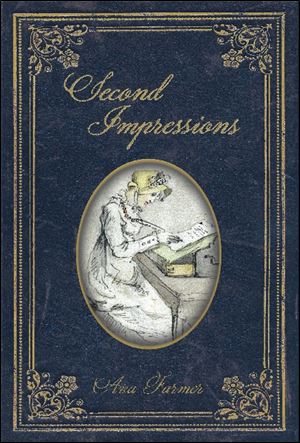
The inimitable, imitated well
7/22/2012
Second Impressions, by Ava Farmer (aka Sandra Lerner). (Chawaton House Press; 412 pages; $27)
It is a truth universally acknowledged that when the modern man or woman tires of the travails of life, he or she seeks escape; all of us choose differently, depending on our predilections, weaknesses, or stamina. Some play golf, some turn to drink, some post incessantly on Facebook, and some read Jane Austen.
And reread her.
And reread her again, until finally, after the 100th tour through Pemberley, we might, in desperation, turn to the sequels, the prequels, the chick lit, the erotic fan fiction, the zombies, the vampires, the endless PBS adaptations.
Now, though, comes Ava Farmer's Second Impressions, which is another sequel to Pride and Prejudice -- which Austen originally called First Impressions, but changed it so as not to confuse the book with other, similar titles.
How to describe this work, whose author is actually Sandra Lerner, a polymathic Silicon Valley millionaire who read Austen to stay sane in her computational mathematics class at Stanford?
Most Austen knockoffs mangle her plots and ditch the satire for breathless bodice-ripping modern prose. Second Impressions avoids that danger. It is a dazzling piece of scholarship that is also entirely readable and entertaining; as historical fiction it is entirely sui generis.
It may not be Jane Austen, but it comes close.
Lerner spent 26 years researching this novel (for the record, she has said she read Pride and Prejudice 100 times), which is so full of rich detail that it's easy to forget you are not reading a work by someone who didn't live in early 19th-century England as it was transitioning into the Industrial Revolution.
Lerner has Austen's style down cold: there are the same compound-complex sentences, the same subordinate clauses, and the occasional zinger at the end of a passage -- although perhaps not as many as might be wished for. There is more admiration than acidity in Lerner's depiction of Austen's world, although she does have fun in her chapters about the ridiculous Lady Catherine de Bourgh (who tormented poor Elizabeth Bennet so in Pride and Prejudice) and that equally appalling fortune hunter Sir William Elliot from Austen's Persuasion, who also shows up.
If the reader is looking for more intrigue about the Darcys, however, move on. This is a happily married couple, 10 years later, earnest, forward-thinking, affectionate -- and, it has to be said, a little dull, their discussions tending to veer toward the merits of steam vs. coal-fired electricity or animal husbandry, even when they embark on a grand tour of Europe, described in impressive if occasionally overwhelming detail.
That, perhaps, is the only weakness of this book: a plot that simmers slowly, only rarely boiling over, ultimately more travelogue than suspenseful narrative or biting social commentary. But what a travelogue, over the Alps by "chaise-and-four" (Lerner is an expert on 19th-century carriage riding). Fans of France and Italy in the post-Napoleonic era of Byron and Wordsworth will swoon.
Lerner is an avowed feminist, and she insists Austen was one, too. Perhaps, but Austen's unmarried women, to reach their full potential, must marry, or be consigned to obscurity or dependency or worse. While Second Impressions is salted with earnest speeches by Mr. and Mrs. Darcy about the need to grant women autonomy and dignity, Lerner carefully follows the Austen rulebook: Georgiana Darcy, Elizabeth Bennet's sister-in-law, pines away for Col. George Fitzwilliam, and is content to turn down a handsome, clever and rich French count's offer of marriage rather than not marry for love.
No spoilers here, but romance addicts will get their fix, even as Austen scholars may yet look for reasons not to love this book (although the former head of the Bodleian Library at Oxford has praised it).
Then again, maybe not. In art, reproductions are scorned as inferior to an original vision, but this reproduction's design and execution are, undeniably, masterly.
Second Impressions may not be art -- but it is craft, of the highest order.
The Block News Alliance consists of The Blade and the Pittsburgh Post-Gazette. Mackenzie Carpenter is a reporter for the Post-Gazette.
Contact her at: mcarpenter@post-gazette.com, or 412-263-1949.
Mackenzie Carpenter: mcarpenter@post-gazette.com or 412-263-1949.